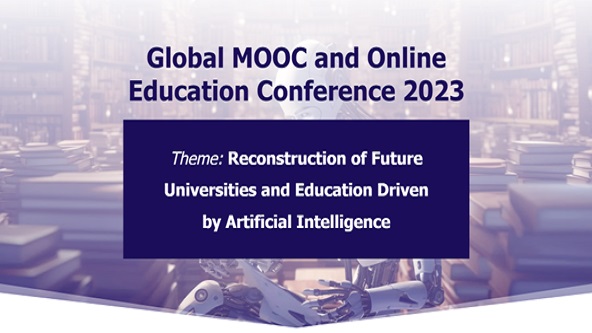—— Under the theme of “Reconstruction of Future Universities and Education Driven by Artificial Intelligence”
—— Participants expressed views on the rapid development of AI technology, and emphasized the need to reconsider how we learn and evaluate the future direction of education
LONDON: The 2023 Global MOOC and Online Education Conference was successfully held in Milan, Italy from December 14th to 16th, 2023. With the theme “Reconstruction of Future Universities and Education Driven by Artificial Intelligence,” the Conference was co-hosted by the Global MOOC and Online Education Alliance and the UNESCO Institute for Information Technologies in Education (IITE), with the joint efforts of Tsinghua University and Politecnico di Milano. Stefania Giannini, UNESCO Assistant Director-General for Education, delivered the opening speech, while Wu Yan, Vice Minister of Education, attended the main Conference as a representative of the Chinese Ministry of Education and delivered a keynote speech. Government officials, universities, and institutional representatives from China, Italy, the United States, Australia, France, the United Kingdom, Indonesia, Thailand, and other countries gave keynote speeches and engaged in panel discussions. Zhan Tao, Director of the UNESCO IITE, delivered the closing remarks.
In her speech, Giannini highlighted the rapid development of artificial intelligence technology and emphasized the need to reconsider how we learn, how we evaluate, and the future direction of education.
Since its establishment in 2020, the Global MOOC and Online Education Alliance has been an important partner of UNESCO, aiming to collaborate with universities and experts from around the world to explore innovative solutions in the field of education.
In his speech, Wu Yan stated that Chinese President Xi Jinping has pointed out “digital education is where our country can achieve breakthroughs in opening up new areas and forming fresh strength of educational development.”
The digital transformation of education is a gradual process and can be divided into three stages: transformation, transition, and intelligence.
The digital transformation of education should uphold “3Cs” – Connection, Content and Cooperation, and adhere to application supremacy, the service-oriented approach, simplicity and efficiency, and security, so as to achieve comprehensive integration. In recent years. Chinese higher education has been playing a leading role, building a more efficient and connected learning environment, developing more abundant and diverse educational resources, creating more ubiquitous and smart application scenarios, promoting more open and inclusive communication and collaboration. Significant achievements have been made in improving the quality of education, promoting a learning revolution, and addressing challenges posed by the COVID-19 pandemic through the implementation of digital transformation in education. This has resulted in an increase in high-quality resources, a scaling-up of learning opportunities, and a deepening of application levels. A distinctive path of digital development in education with Chinese characteristics has been explored. China hopes to join hands with countries around the world, understand and adapt to the new requirements of the digital transformation era, fully leverage digital technology to drive new transformations in student learning, teacher instruction, education governance, and the educational ecosystem, and contribute to the creation of a more vibrant, inclusive, and high-quality future higher education through the digital transformation of education.
During the Conference, Yang Bin, Vice President of Tsinghua University and Special Representative of the Chair of the Global MOOC and Online Education Alliance, and Giuliano Noci, Vice-Rector for China of Politecnico di Milano, jointly released the INFINITE POSSIBILITIES – Report on the Digital Development of Global Higher Education 2023 and The Digital Development Index of Global Higher Education 2023. The report, co-authored by nearly 130 experts from 36 global universities and institutions, gathered the insights of global scholars and experts on the future digital development of higher education. It is divided into three chapters: “Deep Integration: Ubiquitous Transformation,” “Paradigm Reconstruction: Practicing Proactive Change,” and “Challenges and Responses: A Collaborative and Win-win Future”. The report summarizes five historical stages of digital technology leading educational transformation, four new paradigms in digital higher education, and six development trends of digital technology applied in higher education. It also proposes six action strategies to address the current challenges. The index includes four primary indicators: digital educational methods, digital school-running models, digital management systems, and digital guarantee mechanisms. It also includes ten secondary indicators and eighteen specific measurement indicators to reflect the progress, situation, and level of digital development in higher education worldwide. The index provides a reference for countries in formulating strategies for the digital development of higher education.
From December 15th to 16th, four sub-forums were held. The forum topics covered a range of subjects, including “Empowering STEM Education through Digital Technologies,” “Promoting Inclusive Lifelong Education,” “Enhancing Teacher Digital Literacy,” and “Integrate and Innovate AI with Future Capabilities.” Over 60 guests and experts in digital education from renowned universities, platforms, and companies from more than 20 countries and regions, including UNESCO, the United States, the United Kingdom, and France, participated in the discussions both online and offline in a hybrid format. They shared insights and exchanged ideas on the future of digital higher education and the integration and innovative development of artificial intelligence and future capabilities.
During the Conference, it was announced that three organizations, FutureLearn from the United Kingdom, the Indonesia Cyber Education Institute, and the Universidad Nacional Autónoma de México (National Autonomous University of Mexico), have joined the Global MOOC and Online Education Alliance as new members. Representatives and experts from over 70 universities, online education platforms, international organizations, and government agencies worldwide participated in the Conference. –PR




